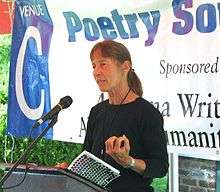Poetry reading

A poetry reading is a public oral recitation or performance of poetry.
Background
Voice is an active, physical thing in oral poetry. It needs a speaker and a listener, a performer and an audience. It is a bodily creation that thrives in live connection. The voice is the mechanism by which a "poet's voice" comes alive.[1] Reciting a poem aloud the reciter comes to understand and then to be the 'voice' of the poem.[2] As poetry is a vocal art, the speaker brings their own experience to it, changing it according to their own sensibilities,[3] intonation, the matter of sound making sense; controlled through pitch and stress, poems are full of invisible italicized contrasts.[2] Reading poetry aloud also makes clear the "pause" as an element of poetry.[4]
"The hearing knowledge we bring to a line if poetry is a knowledge of patterns of speech we have known since we were infants." Every speaker intuitively course through manipulations of sounds, almost as if we sing to each other all day.[5] Even after three millennia of writing, poetry retains its appeal to the ear, the silent reading eye thereof, thereafter, hears what it is seeing.[2] Sound that was imagined through the eye gradually gave body to poems in performance.[6]
A public reading is typically given on a small stage in a café[7] or bookstore, although reading by prominent poets frequently are booked into larger venues such as amphitheaters and college auditoriums, 'to take poetry public'.[8]
Poetry readings almost always involve poets reading their own work or reciting it from memory but readings often involve several readers (often called "featured poets" or "featureds"), although normally one poet is chosen as a "headliner".[9]
History
American poet Donald Hall described the increase in emphasis on public readings of poetry in the United States in a 2012 New Yorker magazine blog post where he recounted it a phenomenon that grew in the last half of the twentieth century.[6]
Hall, who speculates that the change may have been due to the star power of Dylan Thomas, wrote, "It used to be that one poet in each generation performed poems in public. In the twenties, it was Vachel Lindsay, who sometimes dropped to his knees in the middle of a poem. Then Robert Frost took over, and made his living largely on the road."[6] Hall suggests that poetry readings have shifted the focus of poetry more towards sound, adding that "In concentrating on sound, as in anything else, there are things to beware of. Revising a poem one morning, I found myself knowing that a new phrase was repellent, but realized it would pass if I intoned it out loud. Watch out. A poem must work from the platform but it must also work on the page."[6]
Poetry slam
A poetry slam is a competitive format that has become increasingly popular, especially in the United States, since its inception in the 1980s. A "slam" is the art of poetry presented in public[10] as is the "open mic" event variant.[11]
See also
References
- ↑ Hirsch, Edward (2014). Voice – A Poet's Glossary. New York: Houghton Mifflin Harcourt. ISBN 9780151011957.
- 1 2 3 Hollander, John (1996). Committed to Memory. New York: Riverhead Books. ISBN 9781885983152.
- ↑ Pinsky, Robert (1995). "The Art of Poetry (Interview with Downing and Kunitz)". Missing or empty
|url=(help) - ↑ Pinsky, Robert (April 27, 2009). "Reading Aloud". New Yorker.
- ↑ Pinsky, Robert (1998). The 'Sounds of Poetry'. New York: Farrer Strauss & Giroux. ISBN 0374266956.
- 1 2 3 4 Hall, Donald (October 26, 2012). "Thank You Thank You". New Yorker. Retrieved March 3, 2016.
- ↑ 'The Poetry Place' at Covent Garden London. "The Poetry Cafe". The Poetry Society.
- ↑ "Words Alive: Taking Poetry Public".
- ↑ Knox, Charles (February 2011). "What is the difference between a poetry slam and a poetry reading?". Quora.com.
- ↑ "Brief Guide to Slam Poetry". New York: American Academy of American Poets. May 29, 2004.
- ↑ Holman, Bob. "Open Mic: The Definition". About.com. New York. Archived from the original on 2016-03-03. Retrieved 2016-02-24.